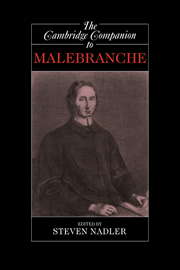Book contents
- Frontmatter
- Introduction
- 1 Malebranche and Method
- 2 Malebranche on the Soul
- 3 Malebranche on Ideas and the Vision in God
- 4 The Malebranche-Arnauld Debate
- 5 Malebranche on Causation
- 6 Metaphysics and Philosophy
- 7 Malebranche's Theodicy
- 8 Malebranche on Human Freedom
- 9 Malebranche's Moral Philosophy
- 10 The Critical Reception of Malebranche, from His Own Time to the End of the Eighteenth Century
- 11 Malebranche's Life and Legacy
- Bibliography
- Index
Introduction
Published online by Cambridge University Press: 28 May 2006
- Frontmatter
- Introduction
- 1 Malebranche and Method
- 2 Malebranche on the Soul
- 3 Malebranche on Ideas and the Vision in God
- 4 The Malebranche-Arnauld Debate
- 5 Malebranche on Causation
- 6 Metaphysics and Philosophy
- 7 Malebranche's Theodicy
- 8 Malebranche on Human Freedom
- 9 Malebranche's Moral Philosophy
- 10 The Critical Reception of Malebranche, from His Own Time to the End of the Eighteenth Century
- 11 Malebranche's Life and Legacy
- Bibliography
- Index
Summary
When the great philosopher, scientist and mathematician Rene Descartes died in 1650, some of his most vehement opponents - and there were many - must have hoped that would be the end of his philosophy as well. Little did they suspect that Cartesianism would be the dominant philosophical paradigm for the rest of the century. In France, the most important Cartesian - perhaps, in fact, the most important philosopher - of this period was a Catholic priest from a prominent and well-connected family in Paris. Nicolas Malebranche was widely recognized by his philosophical and theological contemporaries across seventeenth-century Europe as an intellectual force to be reckoned with, a bold and unorthodox synthesizer of the thought of St. Augustine and Descartes and a systematic thinker of the first rank.
Thus, it is surprising that Malebranche is only now finding his rightful place in the pantheon of early modern figures - along with Descartes, Spinoza, Leibniz, and the others - deemed worthy of study by contemporary philosophers in the Anglo-American tradition. (The French, of course, have recognized his importance all along.) While Malebranche's thought is deeply rooted in his theological agenda and, more broadly, in the particular intellectual and religious environment of early modern France, much of it is of perennial philosophical value, and plenty of his ideas and arguments continue to be of interest to philosophers today. Malebranche is most famous - or, as some would prefer to say, infamous - for his doctrine of occasionalism, an often ridiculed theory in which God is the only true and active causal agent in the universe.
- Type
- Chapter
- Information
- The Cambridge Companion to Malebranche , pp. 1 - 7Publisher: Cambridge University PressPrint publication year: 2000
- 1
- Cited by



